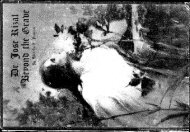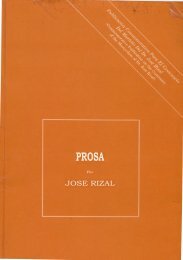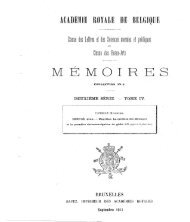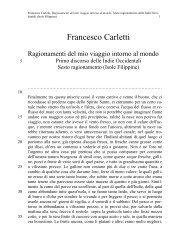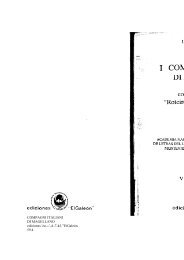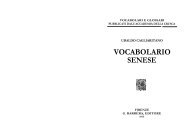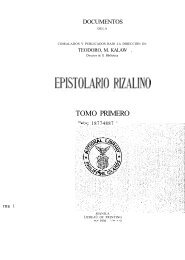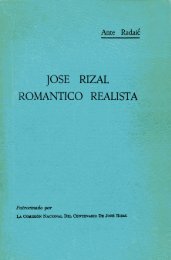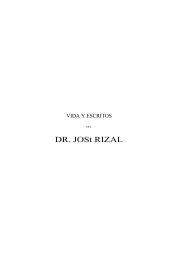- Page 1 and 2:
diced b Jose S. Arc a,
- Page 3 and 4:
Copyright 1988 byPHOENIX PUBLISHING
- Page 5 and 6:
Third and Fourth Trials, 49Fifth Tr
- Page 7 and 8:
INTRODUCTIONA century is not long i
- Page 9 and 10:
Case: 07-15763 08/18/2010 Page: 9 o
- Page 11 and 12:
his country," and intent on writing
- Page 13 and 14:
On 25 October, the first Sunday aft
- Page 15 and 16:
fellow passengets.2 On 1 November h
- Page 17 and 18:
Simeone Angelo Felice Volonteri was
- Page 19 and 20:
charmed those Italian missionaries
- Page 21 and 22:
In this situation, Fr. Vigano faile
- Page 23 and 24:
Exposition to the Queen Regent by t
- Page 25 and 26:
We may suppose there was a special
- Page 27 and 28: an Artillery Corporal 'named Taylo
- Page 29 and 30: attleship which had captured it. An
- Page 31 and 32: "founder," considering the above an
- Page 33 and 34: frequently mixed up the names, plac
- Page 35 and 36: the plea for an indult presented by
- Page 37 and 38: In the same manner, a series of cur
- Page 39 and 40: The lure of greater fortunes in the
- Page 41 and 42: The troops that assaulted Fort San
- Page 43 and 44: Octavo admitted having heard the ap
- Page 45 and 46: which detailed the personal circums
- Page 47 and 48: Filipino patriotism. If, on the oth
- Page 49 and 50: Rizal was convinced of this. He had
- Page 51 and 52: they sought to have them directly s
- Page 53 and 54: scandalizing him and Raimondi perha
- Page 55 and 56: oral examination to impose immediat
- Page 57 and 58: permanent War Council, which senten
- Page 59 and 60: Eleven of those found guilty were c
- Page 61 and 62: Crisanto de los Reyes. Together wit
- Page 63 and 64: imposed for these five cases, while
- Page 65 and 66: interpreted according to the "spiri
- Page 67 and 68: WHEN AND HOW THE NOLI WAS WRITTENAp
- Page 69 and 70: GENESIS OF THE NO L1The novel's imp
- Page 71 and 72: I believe it was Blumentzit who has
- Page 73 and 74: entered the orbit of the men of the
- Page 75 and 76: Philippines: the people, symboliied
- Page 77: On 25 January 1884, he notes in his
- Page 81 and 82: MemoriaThe Novales uprising took pl
- Page 83 and 84: ecause of his influence on the circ
- Page 85 and 86: humility";'' the surprising notice
- Page 87 and 88: sick. He does not pray over those w
- Page 89 and 90: its solution. Its founder was Feder
- Page 91 and 92: and the question therefore was whet
- Page 93 and 94: I am also convinced that the opinio
- Page 95 and 96: you see, my dear boy, that all this
- Page 97 and 98: had studied at the University of Sa
- Page 99 and 100: However that may be, certain paragr
- Page 101 and 102: From these texts, one sympathizes p
- Page 103 and 104: the Philippines seriously, but not
- Page 105 and 106: for twenty years in these lands of
- Page 107 and 108: In his Olvidos de Filipinas (Manila
- Page 109 and 110: apparently in the degree it was tho
- Page 111 and 112: The book bums with praises of reaso
- Page 113 and 114: them as slaves among the conquerors
- Page 115 and 116: eminent Egyptologist [Champollion].
- Page 117 and 118: omanticism" is accepted, however, w
- Page 119 and 120: Rosarito is brought to thephychiatr
- Page 121 and 122: Hence, Noli me tangere can be inclu
- Page 123 and 124: When he was eleven years old, Jose
- Page 125 and 126: times, the Jesuits 4, references to
- Page 127 and 128: While all these unforgettable event
- Page 129 and 130:
are as frequent and serious as thos
- Page 131 and 132:
two phrases not free of some disdai
- Page 133 and 134:
in Madrid, and still in the grip of
- Page 135 and 136:
poverty for the country. Besides, i
- Page 137 and 138:
Someone must have introduced our he
- Page 139 and 140:
himself and whom he observed at clo
- Page 141 and 142:
ordering on admiration, sufficientl
- Page 143 and 144:
the main protagonists in the episod
- Page 145 and 146:
morally, unmasking them before a cr
- Page 147 and 148:
And so, following these premises, E
- Page 149 and 150:
counter-campaign against this deman
- Page 151 and 152:
IV. ON IDENTIFYING THE NOVEL'S CHAR
- Page 153 and 154:
cans in a much more direct manner,
- Page 155 and 156:
confidential information from Fray
- Page 157 and 158:
with a certain frequency in the Phi
- Page 159 and 160:
Jesus Ma. Cavanna tried to do this
- Page 161 and 162:
sinned by excessive optimism. In th
- Page 163 and 164:
shall focus our attention on the re
- Page 165 and 166:
the Franciscans and Governor de la
- Page 167 and 168:
predecessor in the office, sent fro
- Page 169 and 170:
uary, he printed a notice of the cr
- Page 171 and 172:
paper which will provide a more con
- Page 173 and 174:
economic diffiCulties. Many of its
- Page 175 and 176:
Spain. In November, Coria, Arriaga,
- Page 177 and 178:
Some values essential to the primit
- Page 179 and 180:
Without leave of the corresponding
- Page 181 and 182:
46. In the convent of Palanan and o
- Page 183 and 184:
he found in the conversation among
- Page 185 and 186:
form, the entire dramatic argument
- Page 187 and 188:
and the Augustinian might have brok
- Page 189 and 190:
more radically anticlerical politic
- Page 192 and 193:
ONCE MORE THE NOLI—WITH UNDERSTAN
- Page 194 and 195:
uncalled for slurs against his fami
- Page 196 and 197:
choice of names: "Salvadorcito" or
- Page 198 and 199:
In the opening chapter of the Fili
- Page 200 and 201:
Overlooked by many is the final lin
- Page 202 and 203:
In other words, things were so bad
- Page 204 and 205:
evident sarcasm, his "Excellency wa
- Page 206 and 207:
husband for not standing up for her
- Page 208:
nineteenth century law and theory d
- Page 211 and 212:
to manipulate the election results
- Page 213 and 214:
thorough. The family prayed the Ros
- Page 215 and 216:
To be sure, Spain or Madrid in the
- Page 217 and 218:
his eyes, had the potential to lead
- Page 219 and 220:
time of the publication of the nove
- Page 221 and 222:
conditions in the Philippines, and
- Page 223 and 224:
Rizal's alternative to the use of v
- Page 225 and 226:
Tbe anticlimax, in Guerrero's tenn,
- Page 227 and 228:
EARLY LIFEBorn in 1846 in Figueros
- Page 229 and 230:
of the country, Pastells spent the
- Page 231 and 232:
which attests to his ardent desire
- Page 233 and 234:
advocated Catholic unity in its ext
- Page 236 and 237:
THE ROLE OF FERDINAND BLUMENTRITTIN
- Page 238 and 239:
eal rulers were, to all intents and
- Page 240 and 241:
newspaper campaign; the inhumanity
- Page 242 and 243:
Ibanez had also offered to act as a
- Page 244 and 245:
the Philippines by half. The Philip
- Page 246 and 247:
secular rulers of the Filipinos whe
- Page 248 and 249:
hatred of the blind and the ignoran
- Page 250 and 251:
BASIC BIBLIOGRAPHYCompiled by Jose
- Page 252 and 253:
Bantug, Jose P. El Dr. Jose Rizal c
- Page 254 and 255:
First International Congress on Riz
- Page 256 and 257:
Ramon Ozaeta. New York: Prentice Ha
- Page 258 and 259:
Villanueva, Francisco. Reminiscence
- Page 260 and 261:
Martin, Dalmacio H. "Hamlet and Its
- Page 262 and 263:
ENDNOTESVOLONTERI1. His last "Europ
- Page 264 and 265:
Fressell warehouse where the latter
- Page 266 and 267:
18. Rizal to Blumentritt, aboard th
- Page 268 and 269:
Blumentritt about the pastor of his
- Page 270 and 271:
unity of Spain and the confessional
- Page 272 and 273:
61. AHN, "Ultramar," 5216, exp. 26;
- Page 274 and 275:
97. Artigas y Cuerva, Op. cit., 126
- Page 276 and 277:
119. ACPF, "S. C. Cma 1867-1868," V
- Page 278 and 279:
9. "Seeing that only at great loss
- Page 280 and 281:
24. Published in Gaceta de Manila 2
- Page 282 and 283:
7. EJR, II, 3-1, 91. Italics mine.8
- Page 284 and 285:
vengeance alive . . . ." Graciano L
- Page 286 and 287:
36. * Not to overwhelm the reader w
- Page 288 and 289:
53. Noll, 50.54. Schumacher. Father
- Page 290 and 291:
(1872), 70-71. This was the typical
- Page 292 and 293:
83. Casimiro Herrero, 0. S. A., Fru
- Page 294 and 295:
120. I ask the reader to read again
- Page 296 and 297:
ut it agrees with those who know th
- Page 298 and 299:
19. Morga-Rizal, Sucesos (Paris, 18
- Page 300 and 301:
31. Diario: ER, I, 252-253.32. Loc.
- Page 302 and 303:
49. John N. Schumacher, S. J., "The
- Page 304 and 305:
Excellency, the Most Reverend Eccle
- Page 306 and 307:
it blamed his failure on "the monas
- Page 308 and 309:
116. Felix Huerta, 0. F. M., "Carta
- Page 310 and 311:
4recommend to us confidence in the-
- Page 312 and 313:
19. Op. cit., 224-225.20. Op. cit.,
- Page 314 and 315:
24. Pablo Pastells, S. J., MisiOn d
- Page 316 and 317:
16. Letter to Paciano, 1885: Op. ci
- Page 318 and 319:
THE ROLE OF BLU1VIENTRITT1. The Riz
- Page 320:
LEANDRO TORMO SANZ, Ph.D. (Madrid)



